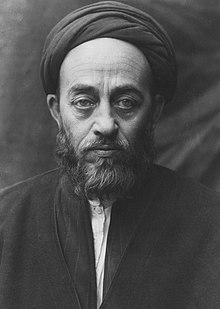Loading AI tools
Iranian scholar, theorist, philosopher (1903–1981) From Wikipedia, the free encyclopedia
Muhammad Husayn Tabataba'i (Persian: سید محمدحسین طباطبائی, romanized: Muḥammad Ḥusayn Ṭabāṭabāʾī; 16 March 1903 – 15 November 1981) was an Iranian scholar, theorist, philosopher and one of the most prominent thinkers of modern Shia Islam.[3] He is perhaps best known for his Tafsir al-Mizan, a twenty-seven-volume work of tafsir (Quranic exegesis), which he produced between 1954 and 1972.[4] He is commonly known as Allameh Tabataba'i and the Allameh Tabataba'i University in Tehran is named after him.
Muhammad Husayn Tabataba'i | |
|---|---|
سید محمدحسین طباطبائی | |
 Tabataba'i in 1946 | |
| Born | 16 March 1903 |
| Died | 15 November 1981 (aged 78) |
| Spouse(s) | Ghamar Sadat Mahdavi (1923–1964, her death) Mansoureh Rozbeh (1966–1981, her death) |
| Era | 20th-century philosophy |
| Region | Iranian philosophy |
| School | Twelver Shia |
| Institutions | Qom Hawza |
Main interests | |
Notable ideas | Interpreting the Quran with the Quran |
| Signature | |
 | |
He received his earlier education in his native Tabriz city, mastering the elements of Arabic and the religious sciences, and at about the age of twenty set out for the great Shiite university of Najaf to continue more advanced studies.[5] He studied at Najaf, under masters such as Ali Tabatabaei (in gnosis), Mirza Muhammad Husain Na'ini, Sheykh Muhammad Hossein Qaravi Esfahani (in Fiqh and Jurisprudence), Sayyid Abu'l-Qasim Khwansari (in Mathematics), as well as studying the standard texts of Avicenna's Shifa, the Asfar of Sadr al-Din Shirazi, and the Tamhid al-qawa'id of Ibn Turkah.
In Najaf, Tabataba'i developed his major contributions in the fields of Tafsir (interpretation), philosophy, and history of the Shi'a faith. In philosophy the most important of his works is Usul-i falsafeh va ravesh-e-realism (The Principles of Philosophy and the Method of Realism), which has been published in five volumes with explanatory notes and the commentary of Morteza Motahhari. If Ayatollah Haeri is considered the reviver of Qom's hawza in an organizational sense, Tabataba'i's contributions to the field of tafsir, philosophy and mysticism represent the intellectual revitalization of the hawza with lasting implications for the curriculum.[3]
Tabataba'i was also a poet who composed mainly in Persian, but occasionally in Arabic.[citation needed] He also wrote articles and essays.[citation needed]
Some of his pupils include:[8][9][10]
Seamless Wikipedia browsing. On steroids.
Every time you click a link to Wikipedia, Wiktionary or Wikiquote in your browser's search results, it will show the modern Wikiwand interface.
Wikiwand extension is a five stars, simple, with minimum permission required to keep your browsing private, safe and transparent.